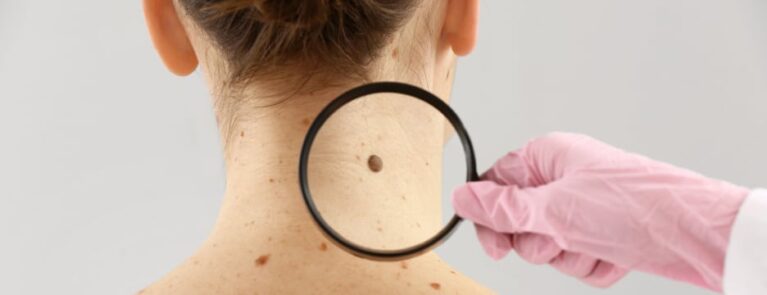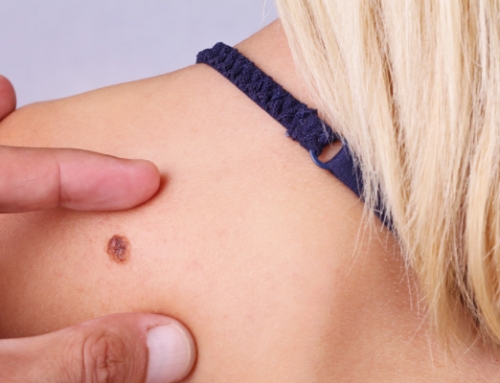Skin cancer is a very common cancer in the United States. It is estimated that 5.4 million cases of basal cell carcinoma and squamous cell carcinoma are diagnosed annually in the United States, according to the American Cancer Society. They are considered the two most common types of skin cancer.
As for melanoma, the most serious type of skin cancer, an estimated 186,680 cases are predicted to be diagnosed in 2023 and the number of deaths is expected to increase to 4.4% this year as well. But, according to The Skin Cancer Foundation, when detected early, the five-year survival rate for melanoma is 99%.
Because of how important early detection is and how serious skin cancer can be, skin cancer screenings are vital to your health.
The main cause of skin cancer is exposure to sunlight which can lead to sunburn and that can ultimately lead to skin cancer over time.
Due to the importance of detecting skin cancer early, let’s take a look at what a skin cancer screening is, what occurs during a screening, and what happens if your doctor finds cancer.
What is a Skin Cancer Screening?
A skin cancer screening involves a board-certified dermatologist personally examining you while looking for suspicious spots on the skin, scalp, or nails to identify any spot that should be either followed over time for changes or tested for pre-cancer or cancer. When abnormal spots or suspicious moles are identified early and turn out to be cancer, it can be much easier for your dermatologist to treat and cure.
Skin cancer screenings can be especially beneficial for people who are at increased risk for skin cancer. According to the CDC, these risk factors can include those who have a family history of skin cancer, older people, people with lighter skin, people with blonde or red hair, people who have freckles or a large number of moles, and those who tend to burn easily.
But it’s also important to remember that your doctor suggesting a screening test doesn’t mean the results are guaranteed to show cancer. Suspicious-looking moles may turn out to be fine, but it’s important to check them to be sure. It’s better to have a skin cancer screening and find no cancer than not have one and discover later on that it’s actually something serious.
What Happens During A Skin Cancer Screening?
Screenings for skin cancer should start with you regularly checking your skin at home. If there are any spots you’re worried about, make sure to let your doctor know at the screening appointment.
Before heading to your screening, make sure to avoid wearing makeup and keep your hair loose so your scalp can be examined easily. Ideally, also remove finger and toenail polish so your dermatologist can examine your nails for skin cancer as well.
The actual skin cancer screening itself is performed by a dermatologist, first having you change into a gown (underwear may be kept on or removed) and then examining your skin from the scalp to the toes herself. She will be looking for moles, birthmarks, and other spots that may look abnormal in color, size, shape, or texture. She will ask if you notice any changes in any spots, but if you haven’t noticed anything, that is ok.
Your doctor may also use a dermatoscope which is a small handheld lighted magnifier that allows your doctor to evaluate an area of skin much more closely.
If she does find a spot that looks suspicious, she may do a biopsy where she will remove a small piece of skin and send it to a lab where a dermatopathologist will examine the tissue under the microscope to look for abnormal cells. If the tissue is benign, nothing needs to be done, but if the cells are pre-malignant or malignant, further action may need to be taken such as freezing, scraping, or a small excision with local anesthetic to remove remaining abnormal cells.
What Occurs If the Screening Finds Skin Cancer?
If the biopsy comes back and the cells turn out to be malignant, there are quite a few treatment options available as mentioned above. If there is evidence or risk that the cancer is more advanced and may spread to other areas of the body, your dermatologist will refer you to an oncologist for further evaluation.
How Often Should A Skin Cancer Screening Be Done?
If you are at low risk for skin cancer and your screenings are free of concern, most dermatologists recommend screening once per year. But if you are at higher risk for skin cancer, or have had several skin cancers, your doctor may recommend screening every six months.
Reducing Your Risk of Skin Cancer
Beyond getting a regular skin cancer screening, there are other ways to help reduce your risk of skin cancer. Some of the ways you can reduce your risk according to the JAMA Network include:
- Wearing sunscreen with an SPF of 30 or higher and reapplying it often
- Wearing a wide-brimmed hats
- Wearing clothes that cover your skin
- Avoiding tanning beds
- Wearing sunglasses
- Staying in the shade as much as possible when outside
Schedule A Consultation
If you’re looking for a board-certified dermatologist to perform a skin cancer screening or to help you create a skincare regimen, scheduling a consultation with Dr. Krant at Art of Dermatology at the Laser & Skin Surgery Center of New York is the perfect first step. She will discuss your concerns, check you for skin cancer, and help you build a treatment plan that meets your needs.
To schedule an appointment at our New York City office, call us at 212-488-5599 or use our online contact form.
Jessica Krant, M.D., MPH, is a board-certified dermatologist with specialized experience in cosmetic, laser, surgical, and medical dermatology, but above all, Dr. Krant is most proud to be a caring, comprehensive physician who takes the time to listen and send her patients home with a smile.















Leave A Comment